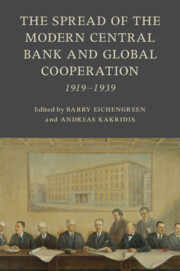Book contents
- The Spread of the Modern Central Bank and Global Cooperation
- Studies in Macroeconomic History
- The Spread of the Modern Central Bank and Global Cooperation
- Copyright page
- Contents
- Figures
- Tables
- Editors and Contributors
- Preface
- Part I General
- 1 Interwar Central Banks
- 2 The Ideology of Central Banking in the Interwar Years and Beyond
- 3 Habit Not Heredity
- 4 Institutionalizing Central Bank Cooperation
- Part II Specific
- Index
- References
3 - Habit Not Heredity
Central Banks and Global Order
from Part I - General
Published online by Cambridge University Press: 02 November 2023
- The Spread of the Modern Central Bank and Global Cooperation
- Studies in Macroeconomic History
- The Spread of the Modern Central Bank and Global Cooperation
- Copyright page
- Contents
- Figures
- Tables
- Editors and Contributors
- Preface
- Part I General
- 1 Interwar Central Banks
- 2 The Ideology of Central Banking in the Interwar Years and Beyond
- 3 Habit Not Heredity
- 4 Institutionalizing Central Bank Cooperation
- Part II Specific
- Index
- References
Summary
The chapter describe the pivotal role of central banks in stabilizing the international system after 1918. It explains how central bankers were drawn into peace-making efforts, although they had no formal role either in the Paris Peace Conference in 1919, or in the League of Nations, the world’s first multipurpose international organization that was set up in the wake of the war. In the 1920s, central banks would play a pivotal role in global governance, aided by the League’s Economic and Financial Organization (EFO), a forerunner of the institutions created at Bretton Woods after the Second World War. The EFO was instrumental in stabilization of central and eastern Europe, helping also to establish new central banks in the region. The chapter concludes by exploring the significance of central bankers’ breach with the EFO after 1928, the creation of the Bank of International Settlements, and the legacy of these developments for global order in the second half of the 20th century.
Keywords
- Type
- Chapter
- Information
- The Spread of the Modern Central Bank and Global Cooperation1919–1939, pp. 57 - 79Publisher: Cambridge University PressPrint publication year: 2023



